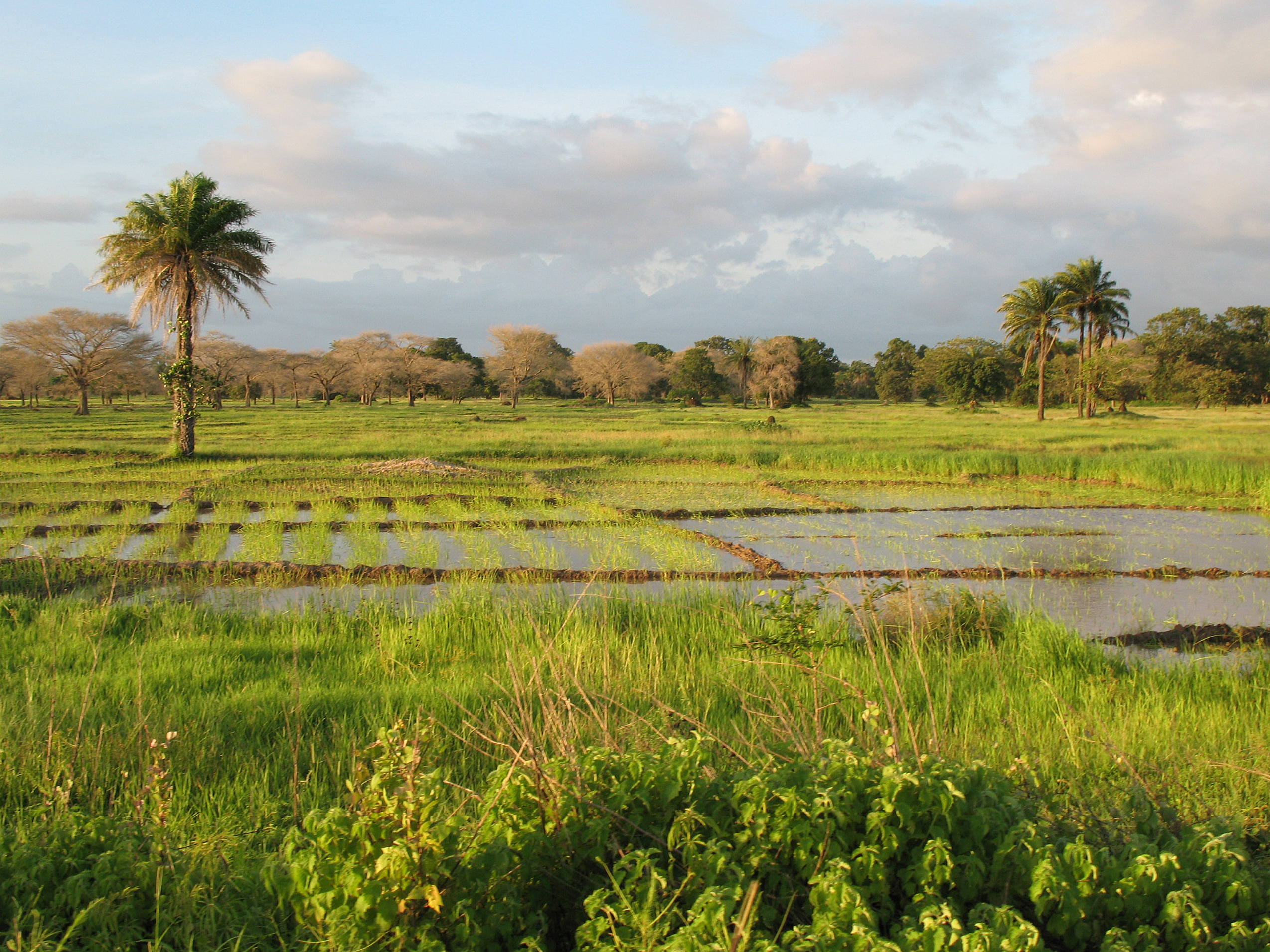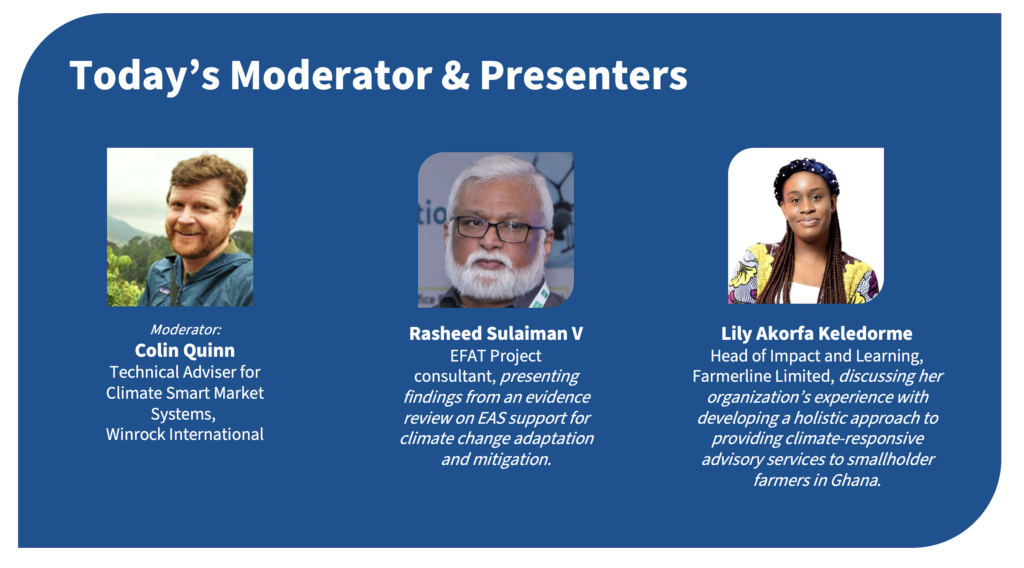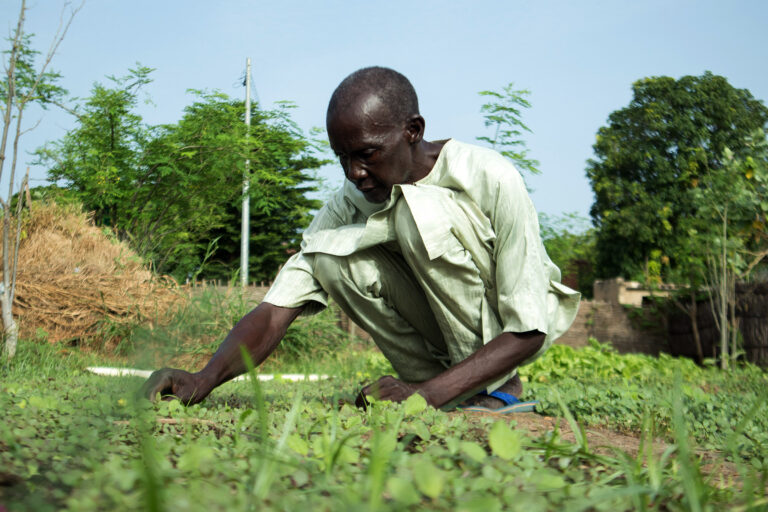
Winrock hosts first in series of learning events on climate-responsive agricultural extension
“Agricultural extension and advisory services and systems is a topic that does not get much attention even though these services are critical for addressing the problem of low agricultural productivity, improving farmers’ livelihoods and helping them cope with shocks and mega crises such as climate change and COVID-19,” says Sonii David, project director of the USAID Enabling Farmers for Agricultural Transformation project.
Implemented by Winrock International in Senegal and Ghana as an associate award under the West Africa Farmer-to-Farmer program, the EFAT project has set out to change that dynamic, working with local agricultural service providers to ensure smallholder farmers have access to the technologies, information, training and services they need to become climate-smart producers in a rapidly changing world. The project held the first in a series of webinars to share approaches and strategies to expand the reach and effectiveness of agricultural extension and advisory services (EAS), with a larger goal of supporting USAID missions globally to strengthen EAS programming with emphasis on developing climate-responsive, inclusive practices and approaches.

The first webinar, “Developing climate-responsive agricultural extension and advisory services: lessons and opportunities,” aimed to simultaneously build and tap into a community of practice to share experiences, best practices, and knowledge gained from different aspects of climate-responsive extension and advisory approaches already in use. One of the main goals of the series is to share knowledge that can help EAS providers support smallholders to mitigate increasingly complex climate challenges, explore ways to help producers – especially women and youth – sustainably increase productivity and incomes, and to adapt and build resilience while reducing or removing greenhouse gas emissions.
Climate change now affects every part of the world, but smallholder farmers in low and middle-income countries in Africa and Asia are particularly vulnerable, due to a combination of socioeconomic conditions, heavy dependence on rain-fed agriculture, limited access to information on effective climate-adaptive farming approaches, and exposure to increasingly extreme weather events such as droughts, floods, and heatwaves.
David opened the webinar, which drew nearly 200 participants from around the world. Winrock’s technical advisor for climate-smart market systems, Colin Quinn, moderated the event with panelists Lily Akorfa Keledorme, head of impact and learning for Farmerline, a Ghana-based social enterprise that provides tech-based solutions and advisory services to smallholders, and EFAT consultant Rasheed Sulaiman V.
Sulaiman V is an expert in agricultural extension systems who has researched the role of the private sector and ICT in extension, as well as developing new approaches to reach rural women farmers.
During the webinar, both panelists focused on the positive outcomes to be gained from delivering improved EAS to smallholders. Improved services can help smallholders overcome gaps in access to markets, finance and resources and find the information needed to help them adopt new climate- and market-focused technical, management and practical skills.
“We recognize that women, Indigenous communities, especially … small farmers are the ones mostly affected [by climate change],” Sulaiman V said. Reaching these farmers with information about new ways to successfully adapt to changing climatic conditions, such as hotter, drier and/or extreme weather, can help. In addition, EAS can help promote community seed banks and support women farmers with resources to organize seed fairs and exchanges, he said.
In Senegal, EFAT supports extension delivery hubs that strengthen the capacity of multiple public and private sector agricultural service providers to scale up new, climate-resilient varieties of rice, millet and horticultural crops; and to share good agricultural practices and information about integrated pest management and small agricultural machinery. In Ghana, in partnership with Farm Radio International and Farmerline, the project promotes integrated soil fertility management (ISFM) practices and technologies to help farmers better cope with the high price of inputs. EFAT also provides training on ISFM to public sector extension agents, agro-dealers and farmer extensionists. As a result of improved EAS through activities such as those conducted by EFAT, farmers in low- and middle-income countries are beginning to adapt to climate change.
Keledorme spoke about how her company’s phone-based helpline links smallholders to free info about practices, including climate-smart irrigation, which helps to increase plant productivity, and ISFM, which can aid farmers in finding the right fertilizers to compensate for soils deficient in nutrients like phosphorous and nitrogen. Minimizing nitrogen loss through improved practices such as precision fertilizer application, cover cropping, crop rotation, and organic soil amendments helps reduce GHG emissions and mitigates the impacts of climate change.
“Relatively few platforms exist to allow extension professionals to share their knowledge and good practices and for others working in development to learn more about advisory services. To address this gap, the USAID EFAT project seeks to support a vibrant global community of practice to promote knowledge exchange, learning and scaling of proven extension and advisory approaches by organizing various learning events. The webinar on extension and advisory service support for climate change adaptation and mitigation is the first in a series of learning events that EFAT will be organizing over the next few years.”
– Sonii David, project director, Enabling Farmers for Agricultural Transformation
Keledorme added that Farmerline also is “very deliberate about reaching women. Through our workshops, we ensure that our field agents target women. For every farmer … we meet women farmers who are disadvantaged regarding information and resources,” including a lack of weather information tailored to the growing season and a lack of financial literacy and business networking opportunities.
During the question-and-answer period, several questions focused on practical approaches to ensure climate-responsive extension and advisory services reach women and youth.
Keledorme answered that one approach used by Farmerline is to intentionally target value chains in which women are well represented, citing soybeans and cowpeas as two examples in Ghana. Extension messaging targeting these crops encourages women and youth to join and participate in farmer groups and training activities.
“Oftentimes, when we talk about climate change, it’s a lot of doom and gloom,” Quinn said toward the end of the hour-long session.
“The good news is that there are methods and approaches … to alleviate these challenges. We can do things to improve farmers’ resilience; we can do things to reduce greenhouse gas emissions; improve farmers’ income and quality of life. One way we can do that is through stengthening agricultural extension and advisory services.”
Stay tuned to Winrock.org for news about EFAT’s next webinar.
Related Projects

